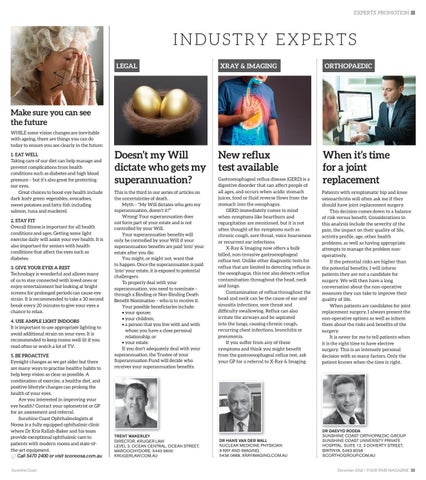EXPERTS PROMOTION
INDUSTRY EXPERTS LEGAL
XRAY & IMAGING
ORTHOPAEDIC
Doesn’t my Will dictate who gets my superannuation?
New reflux test available
When it’s time for a joint replacement
Make sure you can see the future WHILE some vision changes are inevitable with ageing, there are things you can do today to ensure you see clearly in the future: 1. EAT WELL Taking care of our diet can help manage and prevent complications from health conditions such as diabetes and high blood pressure – but it’s also great for protecting our eyes. Great choices to boost eye health include dark leafy green vegetables, avocadoes, sweet potatoes and fatty fish including salmon, tuna and mackerel. 2. STAY FIT Overall fitness is important for all health conditions and ages. Getting some light exercise daily will assist your eye health. It is also important for seniors with health conditions that affect the eyes such as diabetes. 3. GIVE YOUR EYES A REST Technology is wonderful and allows many of us to stay connected with loved ones or enjoy entertainment but looking at bright screens for prolonged periods can cause eye strain. It is recommended to take a 30 second break every 20 minutes to give your eyes a chance to relax. 4. USE AMPLE LIGHT INDOORS It is important to use appropriate lighting to avoid additional strain on your eyes. It is recommended to keep rooms well-lit if you read often or watch a lot of TV. 5. BE PROACTIVE Eyesight changes as we get older but there are many ways to practise healthy habits to help keep vision as clear as possible. A combination of exercise, a healthy diet, and positive lifestyle changes can prolong the health of your eyes. Are you interested in improving your eye health? Contact your optometrist or GP for an assessment and referral. Sunshine Coast Ophthalmologists at Noosa is a fully equipped ophthalmic clinic where Dr Kris Rallah-Baker and his team provide exceptional ophthalmic care to patients with modern rooms and state-ofthe-art equipment.
Call 5470 2400 or visit sconoosa.com.au Sunshine Coast
33.indd 3
This is the third in our series of articles on the uncertainties of death. Myth – “My Will dictates who gets my superannuation, doesn’t it?” Wrong! Your superannuation does not form part of your estate and is not controlled by your Will. Your superannuation benefits will only be controlled by your Will if your superannuation benefits are paid ‘into’ your estate after you die. You might, or might not, want that to happen. Once the superannuation is paid ‘into’ your estate, it is exposed to potential challengers. To properly deal with your superannuation, you need to nominate – through a Binding or Non-Binding Death Benefit Nomination – who is to receive it. Your possible beneficiaries include: • your spouse; • your children; • a person that you live with and with whom you have a close personal relationship; or • your estate. If you don’t adequately deal with your superannuation, the Trustee of your Superannuation Fund will decide who receives your superannuation benefits.
TRENT WAKERLEY DIRECTOR, KRUGER LAW LEVEL 3, OCEAN CENTRAL, OCEAN STREET, MAROOCHYDORE. 5443 9600 KRUGERLAW.COM.AU
Gastroesophageal reflux disease (GERD) is a digestive disorder that can affect people of all ages, and occurs when acidic stomach juices, food or fluid reverse flows from the stomach into the oesophagus. GERD immediately comes to mind when symptoms like heartburn and regurgitation are mentioned, but it is not often thought of for symptoms such as chronic cough, sore throat, voice hoarseness or recurrent ear infections. X-Ray & Imaging now offers a bulk billed, non-invasive gastroesophageal reflux test. Unlike other diagnostic tests for reflux that are limited to detecting reflux in the oesophagus, this test also detects reflux contamination throughout the head, neck and lungs. Contamination of reflux throughout the head and neck can be the cause of ear and sinusitis infections, sore throat and difficulty swallowing. Reflux can also irritate the airways and be aspirated into the lungs, causing chronic cough, recurring chest infections, bronchitis or pneumonia. If you suffer from any of these symptoms and think you might benefit from the gastroesophageal reflux test, ask your GP for a referral to X-Ray & Imaging.
Patients with symptomatic hip and knee osteoarthritis will often ask me if they should have joint replacement surgery. This decision comes down to a balance of risk versus benefit. Considerations in this analysis include the severity of the pain, the impact on their quality of life, activity profile, age, other health problems, as well as having appropriate attempts to manage the problem nonoperatively. If the potential risks are higher than the potential benefits, I will inform patients they are not a candidate for surgery. We will then have a long conversation about the non-operative measures they can take to improve their quality of life. When patients are candidates for joint replacement surgery, I always present the non-operative options as well as inform them about the risks and benefits of the surgery. It is never for me to tell patients when it is the right time to have elective surgery. This is an intensely personal decision with so many factors. Only the patient knows when the time is right.
DR HANS VAN DER WALL NUCLEAR MEDICINE PHYSICIAN X-RAY AND IMAGING 5436 0888, XRAYIMAGING.COM.AU
DR DAEVYD RODDA SUNSHINE COAST ORTHOPAEDIC GROUP SUNSHINE COAST UNIVERSITY PRIVATE HOSPITAL. SUITE 12, 3 DOHERTY STREET, BIRTINYA. 5493 8038 SCORTHOGROUP.COM.AU
December 2021 / YOUR TIME MAGAZINE 33
24/11/2021 2:41:22 PM















